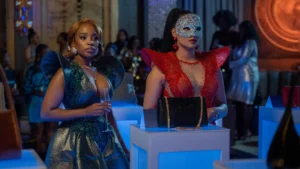Summary
There are some questionable aspects of Lobola Man’s premise that hold it back, but it mostly functions as a serviceable, laidback rom-com.
There’s a certain light-hearted charm to Lobola Man. There’s also a pretty big issue with it, and I’m not sure a moderately happy ending necessarily sidesteps that.
We’ll get there. But first, let’s be clear – there’s a decent rom-com here, one with a culturally and circumstantially fresh-feeling vibe, and it fits nicely into Netflix’s ever-burgeoning African library. Having originally been released in Zulu, it’s a crowd-pleaser for a global streaming audience, and that kind of accessibility shouldn’t go unnoticed.
Sure, Netflix is known for releasing a lot of tripe. But at least everybody can watch it.
My issue with Lobola Man, as fun as it is, is a bit of a nitpick. It probably won’t ruin anyone else’s experiences, though you have to imagine it’ll raise a few eyebrows of viewers who’re used to their romantic comedies being more frictionless.
Lobola, or lobolo, is a term I had to look up. The movie doesn’t do a brilliant job of explaining it if you’re wondering, but it instead distills it down to a pretty core essence. Essentially, it’s a gift – often in the form of livestock – bestowed upon a bride’s family by her prospective husband’s family, essentially as a thank-you for raising a woman worth marrying.
The movie’s protagonist, Ace Ngubeni, thinks it’s a scam, and his job is to negotiate these transfers – often referred to as “bride wealth” or “bride price” – so that people don’t get ripped off. His plans usually involve some light manipulation, impersonating distant relatives, and that sort of thing.
Ace applies a similar methodology to his relationships. He’s a ladies’ man, so when he falls into the ambit of his latest client, Duke, and Duke’s fiancé Zandi, you can see where this is going.
There’s a lot of cliché along the way, but the central love triangle dynamic feels a bit off. Duke’s entire character is him being an incredibly nice guy, so it’s difficult to root for someone who’s supposed to be helping him putting the moves on his missus. This is the issue with the movie for me, though I concede some efforts are made to make it less of a problem than I’m making it sound.
Getting into the details of this will require some spoilers, so don’t read on if you haven’t seen the movie yet.
Lobola Man’s Ending Tries To Justify A Flawed Premise
In order to contrive a happy ending, Lobola Man requires a few different things to happen. First, Duke and Zandi have to break up.
This comes about when Duke hiring Ace is exposed. But it’s worth pointing out that Zandi and Ace were very close to consummating their relationship while the wedding was still on, so this doesn’t necessarily do as a way to justify Ace putting it on Zandi in the first place. If Zandi was that close to reciprocating Ace’s affections, how would the marriage have worked?
As it turns out, Duke tells Ace that he was never that into the idea of marrying Zandi anyway. He’s in love with his PA, Rachael, and his engagement to Zandi was more of an ego boost. As something of a nerd, he never imagined a woman like Zandi would be into him and clung to the relationship for that reason, even though he knew it wasn’t what he wanted.
This isn’t exactly a compliment to Rachael, is it? But whatever.
Needless to say, this frees Zandi up for Ace, who pursues her in a classic “rushing to the airport” scene. He manages to catch up with her on the plane and gives a showy proposal, and the two of them finally admit their feelings for one another and get together. They attend Duke and Rachael’s wedding together as a couple.
So, it all works out, but I must confess that none of this rings true for me. Mileage may vary, of course, but even with this in mind, I’d still say Lobola Man more or less works as a comedy, if not necessarily a romance.
RELATED:




